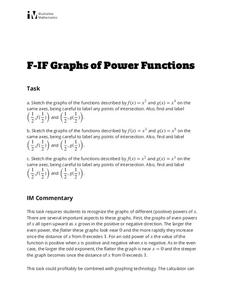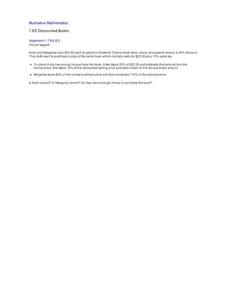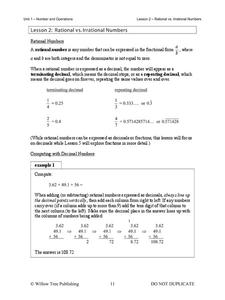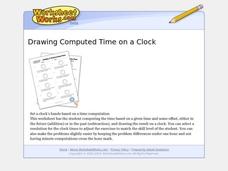Lessonplans Blog Spot
Butterfly Fun
In this addition and subtraction worksheet, students solve a set of nine two-digit addition and subtraction problems. Once finished computing, they color spaces with even-numbered answers blue and odd-numbered answers purple, then color...
Curated OER
Exponential Functions
In this algebra activity, high schoolers compute 4 functions for a given value. They graph 4 functions, and write equations for two graphs. Each function has an exponent as the variable.
Curated OER
Rational Exponents
In this worksheet, 11th graders solve 10 different problems that include various computations with radicals. Answers are not included.
Curated OER
Countdown Challenge: Area of Basic Shapes
In this basic shapes worksheet, learners use formulas to determine the area of given figures. They compute the area of composite figures and subtract the area of shaded areas. This one-page worksheet contains 12 problems.
Curated OER
Countdown Challenge: Experimental Probability
In this probability activity, students compute the experimental probability of an event from given data. They give answers in fraction, decimal and percent form. Students compare the theoretical probability to the experimental...
Curated OER
Subtraction and Unknown Addends
A brief addition word problem has learners searching for the missing addend. They read about Mr. George, who already has five gallons of fuel in his car. Knowing the car can hold eleven gallons, they compute how many gallons he needs....
Illustrative Mathematics
Comparing Products
How can 5th graders show understanding that 30 x 225 is half of 60 x 225 without completing the computation? They can use an area model and draw it out. An array, or an open array, is an area model that allows for young learners to...
Curated OER
Slope & Rate of Change
This short handout addresses the concept of slope in two different ways: geometrically and analytically. Start with a brief description of slope, then use graphical representations to compare positive vs. negative slope and zero vs....
Illustrative Mathematics
Graphs of Power Functions
This activity consists of three exercises in which learners sketch the graphs of various power functions on the same axes. They use their sketches to make comparisons and observations which lead to generalizations about the graphs...
Illustrative Mathematics
Discounted Books
Adolescents love to shop, especially when an item is discounted. Here, shoppers only have a set amount of money to spend. Will they be able to make a purchase with the discount and tax added in? Percent discounts can be calculated...
Willow Tree
Rational vs. Irrational Numbers
Build an understanding of rational numbers and their counterpart irrational numbers. Lead learners through an explanation of rational numbers and the ways they can be expressed. Then introduce them to irrational numbers and make...
EngageNY
End-of-Module Assessment Task — Precalculus (Module 1)
A transformational assessment determines how far pupils are advancing toward mastering complex and matrix standards. The assessment checks the learners' understanding of linear transformations, complex numbers and the complex plane,...
EngageNY
Perimeter and Area of Polygonal Regions in the Cartesian Plane
How many sides does that polygon have? Building directly from lesson number eight in this series, learners now find the area and perimeter of any polygon on the coordinate plane. They decompose the polygons into triangles and use Green's...
EngageNY
Exploiting the Connection to Trigonometry 2
The class checks to see if the formula for finding powers of a complex number works to find the roots too. Pupils review the previous day's work and graph on the polar grid. The discussion leads the class to think about...
College of Marin
General Addition and Multiplication Rules of Conditional Probabilities
Making connections between multiple methods of solving problems is an important part of understanding conditional probability. The lesson shows solutions to problems using Venn diagrams, tree diagrams, formulas, and...
West Contra Costa Unified School District
Correlation and Line of Best Fit
Computers are useful for more than just surfing the Internet. Pupils first investigate scatter plots and estimate correlation coefficients. Next, they use Microsoft Excel to create scatter plots and determine correlation...
Curated OER
Drawing Computed Time On A Clock
For this drawing computed time on a clock worksheet, students explore and analyze how to set a clock's hands based on a time computation. Students either offset the time for the future (addition) or in the past (subtraction).
Curated OER
Computing Time With Two Clocks
In this computing time with two clocks activity, students determine and analyze time differences between two clocks. Students either choose time in the future (addition) or in the past (subtraction).
Curated OER
Computing Time With One Clock
In this computing time with one clock activity, learners examine and practice adding and subtracting time based on what a clock shows.
Curated OER
Math Computation Drill – Multiplication
In this multiplication practice worksheet, students solve 36 problems that require them to multiply 2-digit numbers by 2-digit numbers.
Curated OER
Math 212: Dot Product and Cross Product
In this dot product worksheet, students consider vectors, find the value of an angle, and confirm the area of a given parallelogram. This two-page worksheet contains three problems.
Curated OER
Understanding and Computing Riemann Sums
In this Riemann sum worksheet, students use the Riemann sum to determine the volume of a square pyramid and the estimates of area around a circle. This four-page worksheet contains 18 problems.
Curated OER
Fun Figures
In this mental math worksheet, students solve 4 problems pertaining to scoring points in a target game. Students compute game scores mentally to answer each story problem.
Curated OER
Math 212: Constrained Multivariable Optimization
In this optimization worksheet, students solve problems using the method of Lagrange. They identify the points and distance from the origin in an equation. This two-page worksheet contains three problems.























